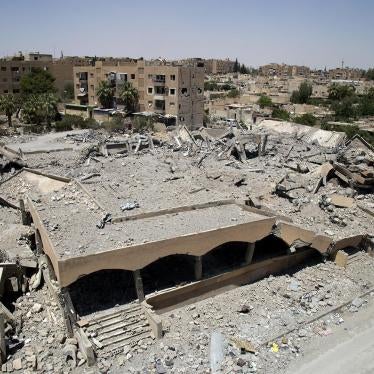Last week in Libya, Human Rights Watch witnessed the destruction of nearly 100 Chinese-made antivehicle landmines – weapons that kill or maim civilians, often children, long after the fighting has stopped.
Human Rights Watch discovered a year ago that Gaddafi’s forces were laying mines in Libya. We broadcast this information to the world and worked to impress the dangers of landmines on Libya’s then-opposition authority, the National Transitional Council (NTC). Shortly thereafter, the NTC publicly pledged not to use landmines and to destroy all mines in its possession.
In mid-February 2012, the post-Gaddafi government in Libya began to carry out its promise to get rid of the weapons, destroying nearly 20,000 mines, weighing two tons all told – a solid first step, but only a fraction of the mines in Gaddafi’s arsenal.
Human Rights Watch first discovered both antipersonnel and antivehicle landmines in Libya in March 2011, only weeks after crossing the border to investigate abuses related to the Arab Spring.
We found the mines near Ghar Yunis University in Benghazi, an area frequented by civilians on foot. Ultimately, we documented and reported on government use of five types of landmines in nine separate locations in Libya.
To help protect Libya’s civilians, we approached the NTC, imploring them to disavow these dangerous weapons. Each year, landmines claim thousands of casualties — mainly civilians — sometimes decades after a conflict is over. Landmines keep farmers from planting and builders from construction, disastrously impeding development.
Our work on landmines in Libya became even more imperative as Gaddafi’s forces gradually lost control of the country, and opposition forces, and even civilians, gained control of Gaddafi’s massive weapon and munitions depots, which contained hundreds of thousands of landmines.
In April 2011, a month after our researchers first confirmed the use of landmines in Libya, the NTC promised Human Rights Watch that it would not use antipersonnel and antivehicle mines. It also pledged to:
- Destroy all landmines in its possession
- Cooperate in providing mine clearance
- Educate people on the dangers of landmines
- Assist landmine victims
Over the past year, local and international demining organizations have been working with Libyan authorities and the United Nations to collect and destroy the mines. So far, this effort apparently has been carried out only in the eastern part of the country, aided by the Libyan Army Corps of Engineers.
Human Rights Watch is pressing the NTC and Libya’s transitional government to emphasize to all militias and local authorities the importance of handing over their landmines for destruction. We are also urging Libya to join the 1997 Mine Ban Treaty, which has already been endorsed by 159 countries.
Now, our researchers are investigating similar abuses in Syria. Only two weeks ago, we reported that Syria’s government is using landmines to stop people from fleeing to safety across its borders with Lebanon and Turkey. We are using this information to press the UN Security Council and influential governments to strengthen sanctions against Syria, to compel the government to end its abuses against its own people.








